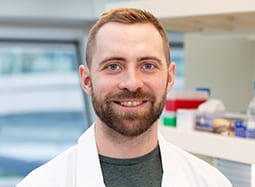Plenary Speakers
Erin Baker, NC State University

Erin Baker is an Associate Professor in the Department of Chemistry at NC State University. She received a BS in Chemistry from Montana State University and PhD in Chemistry from University of California-Santa Barbara. She pursued ion mobility spectrometry (IMS) during her Ph.D. research in Michael Bowers’ Group at the UCSB where she evaluated DNA duplexes and quadruplexes by coupling IMS with mass spectrometry (IMS-MS) measurements. Erin was a post-doctoral researcher and then a scientist in Richard Smith’s group at Pacific Northwest National Laboratory, where she evaluated multidimensional separations for high-throughput proteomic, metabolomic, lipidomic, glycomic and exposomic measurements and worked with different software groups to develop programs to assess the complex data. The Baker group utilizes multidimensional separation techniques such as liquid chromatography, ion mobility spectrometry, and mass spectrometry to evaluate molecules present and changing in biological and environmental systems. Research projects include the development of high-throughput analyses to study numerous samples in a short time period as well as informatics studies to evaluate the complex multi-omic data acquired with available phenotypic data.
Laura Sanchez, University of Illinois at Chicago

Laura Sanchez is an Assistant Professor in Medicinal Chemistry and Pharmacognosy at the University of Illinois at Chicago. Her training includes a BA in Chemistry, Whitman College, PhD in Chemistry, University of California Santa Cruz, and postdoctoral training as a NIH K12 IRACDA Fellow with Pieter Dorrestein at UCSD. She was a K12 BIRCWH Scholar (2016-2017) which supported the translation of the techniques to women’s health, and the Rising Star in the Life Sciences in 2019 at UIC. The Sanchez lab specializes in using and adapting imaging mass spectrometry and tandem mass spectrometry for small molecule analyses in complex systems. Currently, the Sanchez lab’s interest is to elucidate the chemistry by which cells and microbes communicate with one another or with their surroundings to coordinate biological functions in complex backgrounds. The lab uses a variety of biological models to develop these mass spectrometry tools and study the complex chemistry that cells and microbes utilize such as cheese rind derived microbial communities, ovarian cancer, and biofilm forming Gram-negative bacteria. Their work is very interdisciplinary and encompasses aspects of natural products discovery, mass spectrometry (molecular networking and imaging mass spectrometry), microbiology, and host biology, and genome mining.
Sponsored Speakers
Benjamin Schwarz, Rocky Mountain National Lab (sponsored by Sciex)

Benjamin Schwarz received his undergraduate B.S. at Gonzaga University in biochemistry and Ph.D. from Indiana University in Chemistry in the lab of Trevor Douglas studying biological nanomaterial engineering applied to viruses and other self-assembly protein systems. He performed post-doctoral work with Catharine Bosio at Rocky Mountain National Labs focused on the effects of bacterial infection on host metabolism and immune response within the lung compartment. He continues to work with Dr. Bosio at Rocky Mountain as a scientist leading efforts to apply metabolomic and lipidomic methodologies to understand immune responses across multiple pathogen and sterile disease models within NIAID.
Ryan Sheldon, Van Andel Institute (sponsored by Thermo Fisher Scientific)
Ryan Sheldon, Ph.D. is a research scientist and manager of the Metabolomics and Bioenergetics Core at Van Andel Institute. He earned a B.A. in liberal arts/premedical studies and an M.S. in kinesiology from Purdue University before earning a Ph.D. in exercise physiology from University of Missouri. Later, as a postdoctoral fellow at University of Iowa, Sheldon earned an F32 award from the National Institutes of Health to investigate regulation of hepatic lipogenesis by a mitochondrial pyruvate carrier-citrate carrier axis. He also developed the analytical capabilities necessary to establish the University of Iowa’s Metabolomics Core. He joined Van Andel Institute in 2019, where he employed his expertise to launch the Institute’s state-of-the-art Metabolomics and Bioenergetics Core, which provides advanced mass spectrometry services for VAI scientists and trainees. https://metabolomicscore.vai.org/
Judith Simcox, University of Wisconsin Madison (sponsored by Agilent Technologies)
 Judith Simcox is an Assistant Professor in the department of biochemistry at the University of Wisconsin Madison. Her team works to functionally characterize lipids, understand their role in disease etiology, and discovery genetic regulators of these lipids. Her work has been featured on the cover of esteemed journals including Cell Metabolism and Nature Medicine. Judith has won numerous awards including the Paul Shurtleff Hatch and Heidi Hatch Ford Scholar award for outstanding diabetes research, the Leadership for Inclusive Excellence for her work to promote diversity in STEM, and the Harry and Evelyn Steenbock Career Advancement Award for promise as a new investigator.
Judith Simcox is an Assistant Professor in the department of biochemistry at the University of Wisconsin Madison. Her team works to functionally characterize lipids, understand their role in disease etiology, and discovery genetic regulators of these lipids. Her work has been featured on the cover of esteemed journals including Cell Metabolism and Nature Medicine. Judith has won numerous awards including the Paul Shurtleff Hatch and Heidi Hatch Ford Scholar award for outstanding diabetes research, the Leadership for Inclusive Excellence for her work to promote diversity in STEM, and the Harry and Evelyn Steenbock Career Advancement Award for promise as a new investigator.
Ramon Sun, University of Kentucky (sponsored by Waters)
Ramon Sun, PhD, is Assistant Professor of Neuroscience at the University of Kentucky. Dr. Sun completed his undergraduate degree from the University of Auckland; Ph.D. from Australian National University, and post-doctoral fellowship at Stanford University. His lab employs multiple models, from cell-free to animal models, multiple techniques, including metabolomics, histology, genetic manipulations, and pharmacological approaches to tackle complex biological questions. The current research focuses on how N-link glycans affect metabolism and disease progression in Ewing’s Sarcoma and late-onset Alzheimer’s disease.
Invited Oral Presentations
Abraham Badu-Tawiah, The Ohio State University
Jessica Cooperstone, The Ohio State University
Amanda Hummon, The Ohio State University
Glen Jackson, West Virginia University
Janna Kiselar, Case Western University
Thomas O’Connell, Indiana University School of Medicine

